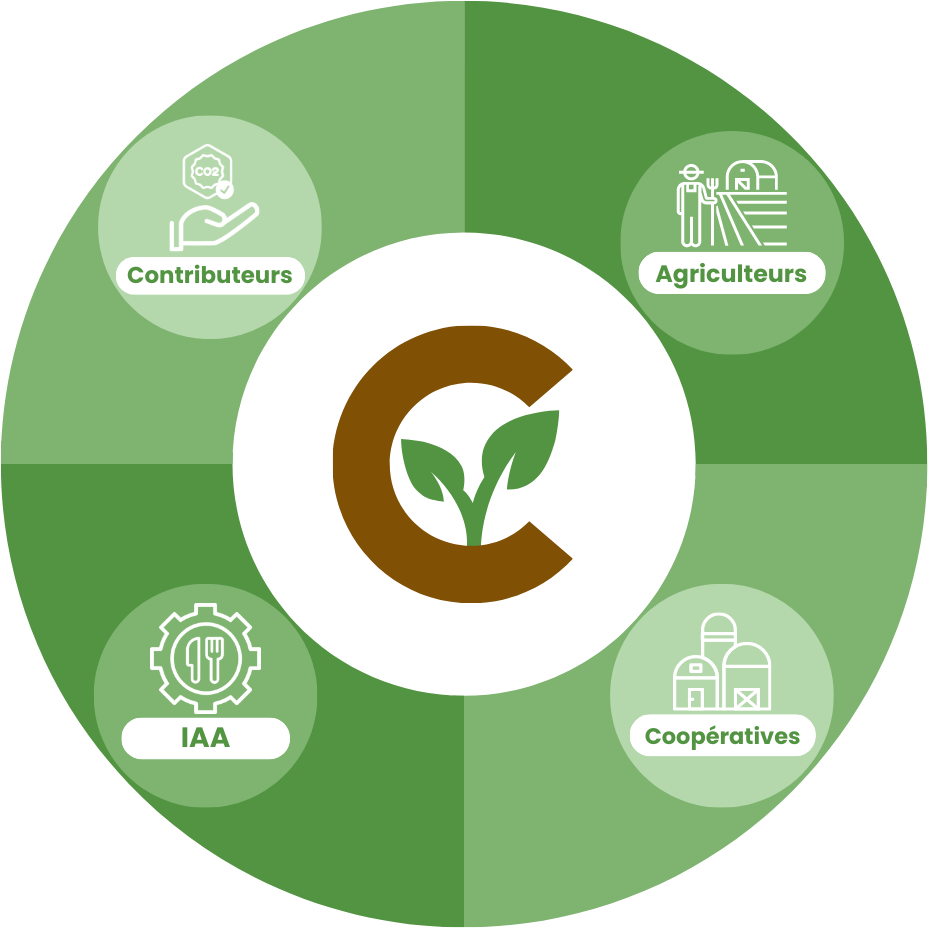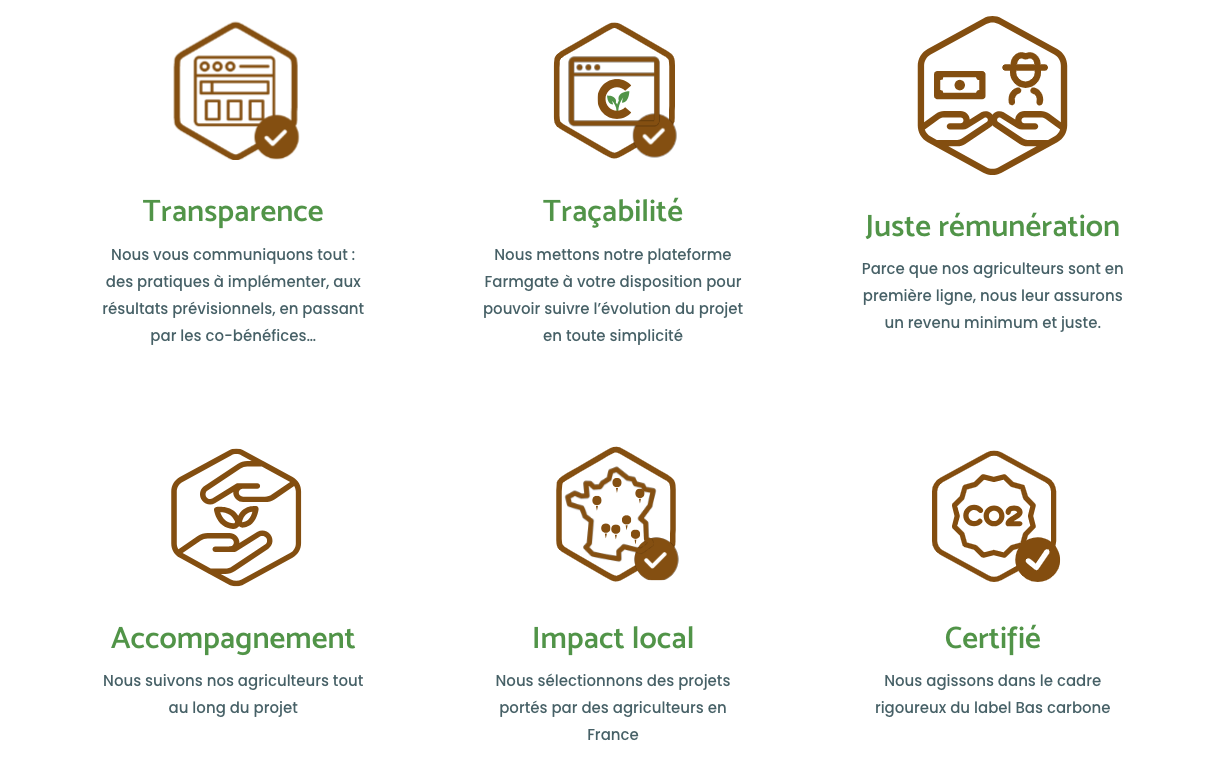Carbone Farmers: creating new low-carbon agricultural sectors
Carbone farmers helps create low-carbon food chains by leveraging data from farms. Here's why we support them.

Agriculture, a sector undergoing transformations
Agriculture emits carbon, but it can also store it
While agriculture is responsible for 25% of the world's GHG emissions, it is also part of the solution, thanks to its dual capacity to significantly reduce emissions and store carbon in the soil.
This is made possible by the implementation of agro-ecological practices, which follow the principles of regenerative agriculture, such as :
- intercropping and planting cover crops,
- partial substitution of mineral fertilizers with organic fertilizers,
- returning crop residues to the soil
In addition to their carbon impact, these practices also offer numerous benefits for farmers and nature:
- they make soils more fertile,
- they facilitate water retention,
- they increase resistance to erosion,
- they are less dependent on inputs,
- they enhance biodiversity, ...
Carbon farming is a promising niche for carbon offsetting
The carbon offset market is divided into two parts:
- the regulated market (= carbon quotas) on the one hand,
- the voluntary carbon market.
The latter reached €2 billion in 2021, and growth forecasts to 2035* are x120(including x30 in loan volume and x4 in value per loan, according to Ernst & Young).
Carbon Farming belongs to the 'nature-based solutions ' segment of the voluntary carbon offset market, which also includes the currently leading reforestation segment.
Carbon Farming offers a number of advantages that should boost its growth in the years to come.
What's more, the decision to give priority to agricultural projects over forestry projects now seems essential.
Forest areas have already increased significantly in recent decades, mainly as a result of agricultural abandonment.
It is becoming essential to preserve agricultural land, particularly from the point of view of food resilience.

Today, there are 400,000 farms in France, covering a Utilized Agricultural Area (UAA) of almost 30 million hectares.
The carbon reduction and sequestration potential is around 1 carbon credit / Ha / year, or 30 million carbon credits per year (the current annual emissions of 3.5 million French people).
With a carbon credit currently valued at €45, the potential market in France is therefore €675 million a year in financing for farm transition, a figure that is expected to grow sharply between now and 2027, driven by the increase in value of carbon credits sold on the offset market (see Ernst & Young's detailed May 2022 study here).
With a UAA of 170 million hectares, mainly in the major agricultural countries of Spain, Germany, Italy, Poland, Romania and the UK, the prospects for new growth in Europe are very good.
Carbone Farmers optimizes the entire value chain
The model is designed to benefit all stakeholders
The company offers the most comprehensive model on the market, optimizing the value chain for all stakeholders.

The farmer
It benefits from :
- recommendations on best practices,
- better funding via carbone credits (75% of the value of the carbon credit, compared to the other market players' 65%)
- a precise analysis of transition cost to provide evidence to transition funders
The cooperative
It features :
- a solution compatible with all types of crop / operation,
- a fee of €200/year/farm, plus 1.5% on the sale of carbon credits.
- support for cooperative technical sales staff in their projects and in aligning specifications with a multi-sector approach.
Food manufacturers and financiers

They have access to :
- improved traceability via a single SaaS platform for tracking emissions reductions
- unrivalled transparency, thanks to data from all the tools we use
More than 300 farmers and a major French group have already signed up
Carbone Farmers has already convinced 4 cooperatives and several major groups involved in the agri-food value chain.
In all, over 300 farmers have signed up to the solution. They are mainly in field crops, in the upstream implementation phase (assessment of carbon potential) and then, by the end of 2022, in the project phase with the start of commercialization of the carbon credits generated.
On the carbon credit buyer side, Carbone Farmers has won a call for competitve offers open to all players developing carbon offset projects in France from one of the country's largest carbon credit buyers, with nearly 2.5 million TCO2e. This is an exclusive 3-year partnership.
In any case, feedback from farmers and companies has been extremely positive:
"For many years now, I've been paying particular attention to the health of my soils, and they've paid me back in spades. So when you talked to me about funding linked to the practices I wanted to put in place, I naturally listened carefully. I chose Carbone Farmers because, not only do you have a good understanding of farmers' issues and are always available, you are also transparent in your approach. I know that I'll receive 75% of the funding with a payment from the start of the first year".
Bertrand Ravillon, farmer in the Marne (51) region
"Our group, which has been involved in territory and carbon offset projects in France since 2015, started to work with Carbone Farmers in the spring of 2022 to benefit from their expertise in supporting innovative agricultural projects of structural importance for territories with strong social and societal co-benefits."
Elodie R., CSR Manager
This excellent field feedback, coupled with strong differentiation factors, leads us to believe that Carbone Farmers will be one of the market's big winners. And all the more so if we take impact perspectives into account.
Proven positive impact
Carbone Farmers provides a solution to the urgent problem of climate change by acting on 2 levels:
- Reducing emissions from the agricultural sector, which accounts for 25% of GHG emissions
- Agricultural resilience in the context of climate change and the quest for food sovereignty
A lasting impact free of any greenwashing practices
This is made possible by an approach that is certified and traceable at various levels:
- the emission of carbon credits is certified by Bureau Veritas. The audit methodology covers all operations, with an annual pre-certification that goes beyond the regulatory framework(which only requires an audit after 5 years).
- backers have access to detailed annual reporting on carbon trajectories achieved in relation to initial targets
- the company integrates monitoring of indicators that are not carbon-based, but which are vital for securing impact: biodiversity, soil, water, etc.
Controlled costs and better value distribution

Carbone Farmers allows the food industry to decarbonize its supply at a controlled cost.
The model distributes transition funding between :
- carbon credits, which are sold outside the value chain to companies wishing to contribute to the transition.
- chain premiums, distributed equitably between the farmer's various outlets, in return for an effective reduction in carbon emissions.
What are supply chain bonuses?
Supply chain bonuses are a 'premium' paid by manufacturers to their suppliers, in return for compliance with set specifications.
Examples: organic, no pesticide residues, GMO-free, maintenance of an area of ecological interest etc...
In the case of carbon, this is a premium calculated on the basis of the actual reduction in the carbon footprint of supplies, which we calculate for each commodity (wheat, barley, corn, rapeseed, etc.).
By way of illustration, the carbon footprint of a yogurt can be reduced by almost 30% by implementing agro-ecological practices.
Carbone Farmers offers a fair distribution of the value created by carbon farming:
- Farmers benefit from 75% of the sale value of carbon credits, the highest percentage on the market, while increasing their income via supply chain bonuses.
- cooperatives are compensated for farm monitoring, and strengthen their ties with farmers through secure low-carbon supply contracts
- the food industry reduces its carbon footprint at a controlled cost
- buyers of carbon credits invest in high-impact projects with strong traceability.
By 2027, in France alone, the company could allow 800,000 cultivated hectares to switch over to regenerative, low-carbon practices, equivalent to the size of a French department like Marne, which represents almost 4 million carbon credits, or the annual carbon footprint of 400,000 French people, the same as a city like Toulouse.
This equates to the sale of almost 1,300,000 carbon credits, generating over €40 million of direct funding for farmers.
For all these reasons, we are very proud to help Carbone Farmers accelerate the deployment of its solution through targeted recruitment and increased visibility with cooperatives and carbon credit buyers.



